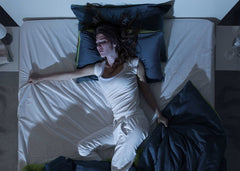Sharing a bed with your partner isn’t as romantic or comfortable as you may see in movies or TV dramas. Couples who sleep in the same bed or bedroom are more likely to experience nocturnal disturbances from their partner, such as snoring, tossing and turning, difference in sleep schedules and poor hygiene. These can all lead to a decline in sleep quality, health issues or even marital spats, which is why an increasing number of couples are now getting a ‘sleep divorce’.

But...what is a ‘Sleep Divorce’?
A sleep divorce doesn’t mean that you have been arguing with your partner or considering splitting up with them. In fact, this simply means sleeping in a separate bed or bedroom from your partner, allowing both of you to sleep according to your own schedule or in the environment that suits you best, without any disturbances from your partner, thereby improving the quality of sleep.

According to a report from the Daily Mail, research from an Australian bedding retailer ‘Bedshed’, nearly 200,000 Australian couples are currently sleeping on separate beds, with the number on a constant rise. Another study commissioned by Sleep Standards also found that over 75% out of 1,008 Americans surveyed believed that sharing sleep spaces with their partner led to poorer sleep quality, and 35% preferred to sleep apart from their partners.
Why should we consider a 'Sleep Divorce'?
Sharing a bed with a partner can indeed lead to restless, or even sleepless nights, something that many couples experience. If we continually experience poor sleep quality or sleep deprivation, we are likely to develop issues such as lowered immunity, depression, obesity, or more serious issues such as diabetes or heart disease. Meanwhile, a 2016 study from the Paracelsus Private Medical University in Nuremberg, Germany, showed that sleep issues and relationship problems tend to occur simultaneously. Another study published in 2017 from the journal ‘Science Direct’ also found that couples who do not get enough sleep are more likely to get into arguments with each other.
If either you or your partner experience poorer sleep quality and frequently get disturbed while sleeping together, in turn affecting your partner relationship, it may be wise to consider sleeping apart from each other. Here are some common sleep disturbances to look out for when considering a ‘sleep divorce’.
1. Different Sleep Schedules
You may prefer to sleep early while your partner stays up until much later at night. This may already cause enough disturbance to keep you awake at night, especially if you generally have difficulty falling asleep. Sleeping in separate bedrooms might be the solution for restful sleep without any interruptions from your partner.

2. Snoring
Snoring is one of the top reasons people struggle with sleep. Imagine being completely exhausted after a long day and desperate for a good night’s sleep at night. However, you’re being kept awake throughout the night from the crackles of your noisy partner. According to snoring statistics, snoring is the third most common cause for divorce in the United States, just behind infidelity and financial troubles. It’s no surprise that snoring can destroy your relationship with your partner.

3. Different Sleep Habits
Do you have very different sleep habits from your partner? Some people prefer to leave a dim light on when they sleep or leave the curtains slightly open while others prefer a pitch black environment. Your partner is used to having some background noise when they sleep while you need a room that is completely silent to fall asleep. If you cannot reach a compromise with your partner, this will not only affect sleep quality, but will also affect your health and well-being, and potentially damage your relationship with your partner.
4. Light / Sensitive Sleepers
If you’re a light or sensitive sleeper, then you might find it difficult to sleep or be disturbed by even the slightest tosses and turns from your partner during the night, and any sounds that may come with your partner’s movements in bed.
Although sleeping apart does come with some major potential benefits, such as fewer disruptions to your sleep cycle, deeper sleep, improved relationships with your partner and better health, it might not work for everyone. If a ‘sleep divorce’ isn’t possible, then you can consider choosing a mattress that’s designed for minimal partner disturbance.
A Mattress For Minimal Partner Disturbance
To minimise partner disturbance, some couples prefer to have a larger bed than to sleep in separate beds. With a larger bed, you can still get close with your partner, but also have the space to stretch out and reduce the possibility of getting disturbed while asleep. However, this only works if your bedroom is large enough and your mattress is designed to effectively absorb motion, especially if you’re a light sleeper.
Skyler mattresses are constructed by combining layers of premium foam materials to offer maximum comfort and spinal support, which can also effectively absorb movement and eliminate partner disturbance, providing couples with a peaceful night’s sleep, even for light or sensitive sleepers. Additionally, Skyler mattresses are designed to allow air to circulate and are highly breathable, effectively dispersing heat from your body while you’re asleep. With fewer disruptions to your sleep, you’re more likely to sleep better, improving health and also your relationship with your partner!

Sleep decisions are very personal. No matter which arrangement works best for you and your partner, it is most important that both of you are able to sleep well and maintain a healthy relationship together.




